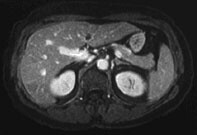No improved survival versus conventional chemoembolization, which has better response rate
FRIDAY, Sept. 11, 2015 (HealthDay News) — For patients with unresectable hepatocellular carcinoma, treatment with conventional chemoembolization is associated with improved outcomes versus drug-eluting beads transarterial chemoembolization, according to a study published online Sept. 2 in the Journal of Gastroenterology and Hepatology.
Antonio Facciorusso, M.D., from the National Cancer Institute in Milan, and colleagues compared drug-eluting beads transarterial chemoembolization with conventional chemoembolization in two cohorts of unresectable hepatocellular carcinoma patients. Data were assessed for 104 patients who underwent conventional chemoembolization and 145 who underwent drug-eluting beads chemoembolization.
The researchers found that the objective response rates were 85.3 and 74.8 percent after conventional and drug-eluting beads chemoembolization, respectively (P = 0.039); median times to progression were 17 and 11 months, respectively (P < 0.001). In multivariate analysis, treatment regimen was the only independent predictor of progression (hazard ratio, 2.01; 95 percent confidence interval, 1.45 to 2.80; P < 0.001). In the two groups, median survival was 39 and 32 months, respectively (hazard ratio, 1.33; 95 percent confidence interval, 0.94 to 1.87; P = 0.10); patients with bilobar neoplasia, portal hypertension, and alpha-fetoprotein above normal limits had a significant survival advantage with conventional chemoembolization.
“In a large series of Western hepatocellular carcinoma patients, drug-eluting beads chemoembolization with 100 to 300 µm particles did not seem to improve survival in comparison to conventional chemoembolization, which in turn provided better tumor responses and time to progression,” the authors write.
Copyright © 2015 HealthDay. All rights reserved.








